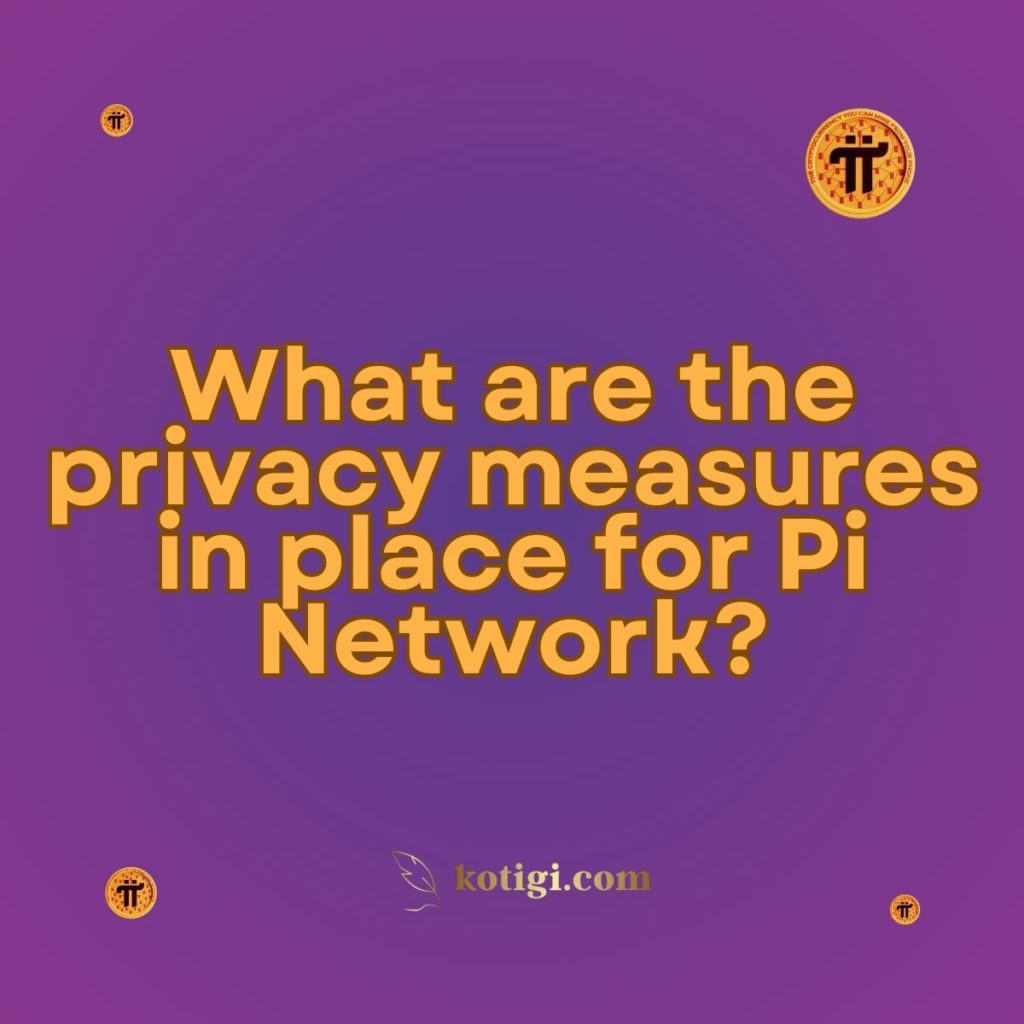
What are the privacy measures in place for Pi Network?
Pi Network incorporates several privacy measures to protect its users’ data, including encryption, decentralized identity verification through KYC, and secure transaction methods on its blockchain. These privacy safeguards are designed to ensure that user information and activities remain confidential and secure, making Pi Network a trustworthy platform for its growing global community.
Introduction
In an age where privacy is becoming increasingly important, especially in the world of digital currencies and blockchain technology, Pi Network has implemented several privacy measures to protect its users. As more users join Pi Network and begin to mine and trade Pi coins, concerns about the security and confidentiality of personal data naturally arise. This article will delve into the various privacy measures Pi Network has put in place to ensure that users’ data is handled securely and transparently.
Comparison table contrasting Pi Network’s privacy measures with other cryptocurrency platforms
Here’s a comparison table contrasting Pi Network’s privacy measures with other cryptocurrency platforms, focusing on privacy, data security, and user control:
| Aspect | Pi Network | Bitcoin | Ethereum | Monero (XMR) |
|---|---|---|---|---|
| Data Encryption | End-to-end encryption for user data transmission and storage. | Limited encryption for transactions on public ledger. | No native encryption for user data or transactions. | Advanced encryption to conceal transactions and data. |
| Decentralized KYC Verification | Decentralized KYC verification to protect identity. | No KYC implemented by default (depends on exchanges). | No built-in KYC, optional for certain services. | No KYC, focuses on anonymity and privacy. |
| Transaction Privacy | Transaction data is transparent but personal info is confidential. | Public transactions visible to all. | Transactions visible on the public ledger. | Complete transaction privacy (untraceable). |
| User Control Over Data | Users have control over how their personal data is used. | No control over data once on the blockchain. | No personal data management, fully public ledger. | Full user control over data privacy. |
| AML Compliance | Compliance without compromising user privacy. | Dependent on exchange regulations. | Dependent on platform or exchange used. | No AML measures integrated; focuses on privacy. |
| Privacy Measures | Encryption, secure app infrastructure, data breach prevention. | Basic blockchain security. | Basic blockchain security. | Ring signatures and stealth addresses ensure privacy. |
| User Education on Privacy | Educates users on privacy best practices. | Limited user education on privacy. | User education based on platform tools. | Extensive user education due to privacy focus. |
| App Infrastructure | Multi-factor authentication (MFA), encrypted communications. | No dedicated app, relies on third-party wallets. | Uses third-party wallets for security features. | Third-party apps with built-in privacy features. |
Analysis:
- Pi Network offers a balance between privacy and compliance, focusing on protecting user data through encryption and decentralized KYC while still adhering to AML regulations.
- Bitcoin and Ethereum are transparent networks that expose transaction details on public ledgers, making them less private.
- Monero, in contrast, prioritizes privacy and anonymity, with advanced features that make transactions untraceable and data confidential, sacrificing some transparency in return for user privacy.
This comparison showcases how Pi Network sits between privacy-focused platforms like Monero and more transparent networks like Bitcoin or Ethereum.
1. Overview of Pi Network’s Privacy Commitment
1.1 Pi Network’s Privacy Policy
Pi Network has outlined its commitment to privacy in a detailed privacy policy that explains how user data is collected, used, and protected. This ensures transparency and trust among its users.
1.2 Importance of Privacy in Blockchain
Blockchain technology inherently offers a certain level of transparency due to its decentralized nature. However, Pi Network takes additional steps to ensure that user data is kept private, especially when dealing with sensitive information such as identity verification and transaction history.
2. Data Encryption
2.1 End-to-End Encryption
Pi Network utilizes end-to-end encryption to safeguard communication and data between users and the platform. This prevents unauthorized third parties from accessing sensitive information during transmission.
2.2 Protecting User Data
Encryption ensures that personal information such as names, email addresses, and transaction data are encrypted before being stored on Pi’s servers. This makes it difficult for hackers to intercept or manipulate the data.
3. Decentralized Identity Verification
3.1 KYC Process and Privacy
Pi Network uses a decentralized Know Your Customer (KYC) verification process to maintain user privacy. By decentralizing this process, Pi Network reduces the risk of data breaches that can occur in centralized systems.
3.2 Identity Verification without Sacrificing Privacy
Although KYC requires users to submit personal information for verification, Pi Network ensures that this data is used solely for verification purposes and is not shared or sold to third parties.
3.3 Protecting Against Identity Theft
Pi Network takes additional precautions to protect users from identity theft during the KYC process, ensuring that personal data remains secure even as new users are verified on the network.
4. Secure Transaction Methods
4.1 Privacy in Blockchain Transactions
One of the key features of blockchain technology is its ability to provide secure and transparent transactions. However, Pi Network ensures that while transaction data is visible on the blockchain, sensitive personal information remains confidential.
4.2 Ensuring Transaction Anonymity
Although Pi Network transactions are recorded on the blockchain, users’ identities are not linked directly to their transactions. This ensures that while the network is transparent, individual users’ privacy is protected.
4.3 Preventing Transactional Data Leaks
Pi Network uses advanced privacy protocols to prevent the leakage of transactional data, ensuring that user identities are not revealed in the process of conducting transactions.
5. User Control Over Personal Data
5.1 Giving Users Control
Pi Network empowers its users by allowing them to control how their data is used on the platform. Users can choose what information they share and with whom, ensuring that privacy remains in their hands.
5.2 Data Minimization Principles
In line with privacy standards, Pi Network follows data minimization principles, collecting only the necessary information required for users to operate on the network. This reduces the risk of unnecessary data exposure.
5.3 Consent for Data Usage
Pi Network operates with full user consent. Users are informed about how their data will be used, ensuring transparency and giving them the ability to opt in or out of certain data-sharing practices.
6. Blockchain Privacy and Transparency Balance
6.1 Balancing Privacy and Transparency
Pi Network walks a fine line between the transparency required in blockchain technology and the need for user privacy. The platform ensures that while transactions are verifiable on the blockchain, user identities and sensitive data are protected.
6.2 Privacy Challenges in Decentralized Systems
Maintaining privacy in a decentralized network like Pi can be challenging, but the platform’s design allows for both transparency in operations and privacy in user data. Pi Network strives to overcome these challenges by constantly improving its security protocols.
7. Anti-Money Laundering (AML) and Privacy Considerations
7.1 AML Compliance and Privacy
While adhering to Anti-Money Laundering (AML) regulations, Pi Network ensures that user privacy is not compromised. The platform uses privacy-preserving technologies to comply with regulations without exposing sensitive user data.
7.2 Secure Monitoring for Illicit Activity
Pi Network employs privacy-conscious monitoring systems that detect illegal activities without infringing on users’ rights to privacy. This helps maintain a safe and compliant network while safeguarding user data.
8. Measures Against Data Breaches
8.1 Preventing Cyber Attacks
Pi Network implements advanced cybersecurity measures to prevent data breaches. This includes firewalls, encryption, and monitoring systems that detect potential threats and prevent unauthorized access to user data.
8.2 Response to Data Breach Attempts
In the event of a data breach attempt, Pi Network has protocols in place to respond swiftly, including notifying affected users, containing the breach, and ensuring that no sensitive information is compromised.
8.3 Regular Security Audits
To ensure its systems remain secure, Pi Network conducts regular security audits. These audits help identify vulnerabilities in the system and improve the platform’s overall privacy measures.
9. Secure App Infrastructure
9.1 Security Features of the Pi Network App
The Pi Network app, used for mining and transactions, is built with robust security features to protect user data. These features include encrypted communication channels and secure storage of user data.
9.2 Preventing Unauthorized Access to the App
Pi Network incorporates multi-factor authentication (MFA) and other security mechanisms to prevent unauthorized access to the app, ensuring that only verified users can operate within the network.
10. User Education on Privacy Best Practices
10.1 Educating Users on Privacy
Pi Network provides educational resources to its users, helping them understand the importance of privacy and how to protect their own data while using the platform.
10.2 Encouraging Strong Passwords and Secure Devices
Pi Network encourages users to adopt privacy best practices, such as using strong passwords, enabling MFA, and ensuring that their devices are secure when accessing the network.
10.3 Raising Awareness About Phishing Attacks
Pi Network educates users about phishing attacks and other forms of cyber threats. By raising awareness, the platform helps its users stay vigilant and avoid falling victim to such attacks.
Conclusion
Pi Network has implemented comprehensive privacy measures to protect its users and their data. From decentralized identity verification through KYC to secure transaction methods on its blockchain, Pi Network strives to strike a balance between transparency and privacy. By educating users, incorporating cutting-edge encryption, and regularly auditing its systems, Pi Network ensures that privacy remains a priority as it continues to grow.
Key Takeaways
| Key Takeaway | Details |
|---|---|
| Data Encryption | Pi Network uses end-to-end encryption to protect user data during transmission and storage. |
| Decentralized KYC Verification | The decentralized KYC process ensures privacy while verifying users’ identities. |
| Secure Transactions | Transactional data is protected, with personal information kept confidential on the blockchain. |
| User Control Over Data | Pi Network gives users control over how their data is shared and used. |
| AML Compliance with Privacy Protections | Pi Network adheres to AML regulations without compromising user privacy. |
| Measures Against Data Breaches | The platform has advanced security features in place to prevent and respond to data breaches. |
| Secure App Infrastructure | Pi Network’s app includes robust security features to ensure user privacy and prevent hacks. |
| User Education on Privacy | Pi Network educates users about protecting their privacy and avoiding online threats. |





